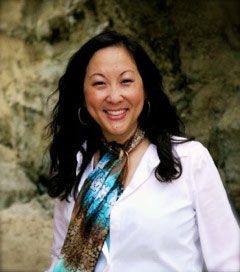The God Who Sees
- reallyadmin
- Jun 23, 2020
- 4 min read
Updated: Feb 1, 2021
Ever feel "unseen"? Misunderstood? I love how my friend, Vivian Mabuni, opens my eyes to see how God sees each and every one of us.
Elisa

The God Who Sees
By Vivian Mabuni
I stood over the sink washing my hands and lost in my thoughts. Out of the bathroom stall to my right an older white woman walked up to the counter and began soaping up her hands in the sink next to mine. She looked over at me and then asked in a very s-l-o-w, louder than normal voice, "You China?" I answered in perfect English with no accent (I was born in Wisconsin and raised in Colorado), "Actually, I grew up in Colorado." She blinked and then asked in the same s-l-o-w, loud voice,"You mommy, daddy China?" I sighed and cringed on the inside and responded, "Yes." And then quickly darted out of the bathroom. This othering, this sense of being a perpetual foreigner, is something I have known all of my life living in the United States as an Asian American. It's the tiring question asked of me (and many Asian Americans) "Where are you from? No, where are you really from?" or worse, such as a video of a white woman screaming at an Asian American laced with all sorts of profanity, "Go back to your country!" Born and raised in the U.S. with blue passport in hand, I am not seen as truly "American." The truth is Filipinos and Chinese first stepped foot in the Americas in 1587. Chinese people fought in the Civil War and helped build the transcontinental railroad in 1865 but part of the history in our country we often don't learn about in school includes a long list of injustices, such as not being allowed to own land or give testimony in a court of law. The Chinese Exclusion Act in 1882 which banned Chinese from immigrating was finally repealed in 1943 when Chinese were finally allowed to become US citizens. We are currently in a time of racial tension in the U.S. Often the conversations around racial reconciliation center on the Black experiences of injustice which rightly need to take place. But other communities of color also experience injustices, including Asian Americans. COVID-19 has sadly been referred to as the "Chinese Virus" which has resulted in a huge increase in anti-Asian racism and hate crimes over the past several months. In the midst of the othering and exclusion of not fitting in, it can be easy for me to feel overlooked and invisible. Sitting in those raw feelings I find solace and comfort in Hagar's story in Genesis. We pick up in Genesis 16. Sarah is unable to get pregnant, so she takes matters into her own hands and orders Hagar, her Egyptian slave, to sleep with Abraham. Hagar ends up pregnant and her relationship with Sarah turns awful. Hagar is treated so harshly by Sarah that she decides to run away. What happens next is extraordinary. In verse 7 an angel of the LORD finds her. Most biblical scholars refer to appearances of the angel of the LORD as theophanies - preincarnate manifestations of the Son of God. Another example of this kind of appearance is when Daniel's friends are thrown into the fiery furnace and are joined by fourth who looked "like a son of the gods" in Daniel 3:25. The Son of God went looking for Hagar and called her by name. If you read all the interactions prior, Abraham and Sarah never called her by her name. But God knew her intimately and her situation. And then they have a one-on-one conversation. Hagar enjoyed a personal conversation with the God of the universe. When they finish, Hagar gives God a name. She is the only one in Scripture to have this honor. She calls him El Roi, which translates to "The God who sees me." Hagar is seen and known by God, and through this powerful and tender interchange God demonstrates his commitment to valuing and honoring women. She is a woman, considered property as a slave, and she is an outsider as a Gentile. She is probably the least likely person to have an extended conversation with the God of the universe. When I feel invisible or overlooked, I find hope in El Roi, the God who sees me and knows my name and circumstance. He is near to you and me as we look to him and pour out our hearts.

Vivian Mabuni is a national speaker and author. With 31 years serving on staff with Cru, Viv loves teaching about the Bible and practical application to ministry and life. Author of Warrior In Pink and Open Hands, Willing Heart, and host of the brand new podcast "Someday Is Here," Viv loves drinking coffee with her husband of 28 years, Darrin, and marveling at their three young adult kids. Connect with her on Instagram and Twitter @vivmabuni or on her website www.vivianmabuni.com. Vivian is a guest on the God Hears Her Podcast with Elisa Morgan and Eryn Eddy.






Comments